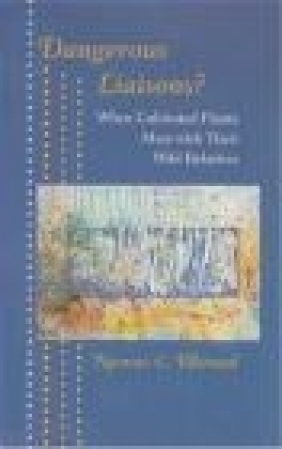Dangerous Liaisons?
Norman C. Ellstrand, N Ellstrand
Dangerous Liaisons?
Norman C. Ellstrand, N Ellstrand
- Producent: Johns Hopkins University Press
- Rok produkcji: 2005
- ISBN: 9780801881909
- Ilość stron: 264
- Oprawa: Miękka
Niedostępna
Opis: Dangerous Liaisons? - Norman C. Ellstrand, N Ellstrand
With the advent of genetic engineering, "designer" crops might interbreed with natural populations. Could such romances lead to the evolution of "superweeds", as some have suggested? But haven't crops had sex with wild plants in the past? Has such gene swapping occurred without consequences? And if consequences have indeed occurred, what lessons can be gleaned for engineered crops? In Dangerous Liaisons? Norman Ellstrand examines these and other questions. He begins with basic information about the natural hybridization process. He then describes what we now know about hybridization between the world's most important crops-such as wheat, rice, maize, and soybeans-and their wild relatives. Such hybridization, Ellstrand explains, is not rare, and has occasionally had a substantial impact. In some cases, the result was problematic weeds. In others, crop genes have diluted natural diversity to the point that wild populations of certain rare species were absorbed into the gene pool of the more common crop, essentially bringing the wild species to the brink of extinction. Ellstrand concludes with a look to the future. Will engineered crops pose a greater threat than traditional crops? If so, can gene flow and hybridization be managed to control the escape of engineered genes? This book will appeal to academics, policy makers, students, and all with an interest in environmental issues. An objective, balanced account of the impact of crop x native species hybridization... Though this book is written in a clear, nontechnical style, it covers the scientific literature well. It is unique in bringing together current knowledge on crop breeding and evolutionary biology. Choice 2004 With insight, originality, and scholarship, Ellstrand brings together classical and current knowledge about crop genetics, hybridization, and evolutionary ecology in a single, comprehensive treatment... This engaging and user-friendly book is a wonderful resource for ongoing biosafety discussions worldwide. -- Allison Snow Information Systems for Biotechnology News Report Everyone interested in the effects of cropping on plant biodiversity, the evolution of weeds, and the risks of GM crops should read this book. -- Rick Roush Nature Dangerous Liaisons? presents a rigorous and even-handed look at the science and technology surrounding crop gene flow. Denial worked fine for 10,000 years, but will not cut it in the era of GM, globalization and rapidly expanding human populations. Much as Rachel Carson did for pesticides four decades earlier, Ellstrand's book serves notice that society will need to come to terms with the genetic promiscuity of agriculture. -- Steven H. Strauss and Stephen P. DiFazio Nature Biotechnology This book will appeal to academics, policymakers, students, and all with an interest in environmental issues. Biology Digest Excellent and easy to read. -- C.R. Bhatia Current Science The first comprehensive synthesis of this diverse literature. Painstakingly researched, this book provides an objective counterpoint to the superficial and biased presentation typically offered by advocacy groups. -- Marzia Salmaso Trends in Ecology and Evolution A valuable evaluation and discussion of our knowledge of gene flow in plants and the implication for transgene movement into wild crop relatives, with great relevance for transgene flow into FV's as well... the book's accessible and informal style make it a pleasure to read. -- Daniela Soleri Bioscience The eye-catching title sets the style, with chapter headings including 'Long-distance Romance', 'Foreplay', and 'Caught in the Act'. Nevertheless, this is a serious book, which should appeal to lay people as academics alike, and just about anyone interested in the controversy over genetically modified crops. Spore Magazine Essential reading... An excellent book. -- David A. Andow Environmental Biosafety Reseach A highly topical and well written contribution to the GM debate, providing the non-expert reader with a much clearer picture of what is known, and what is not known, about the risks of gene transfer to wild plants... [from] a writer who is not only fascinated by his subject, but is determined to pass that fascination on to his readers. New Agriculturist 2005 The book will be widely acclaimed and play an important part in the debate about GM crops. American Journal of Botany Intriguing insights into what happens when cultivated plants mingle with wild ones. Bookwatch 2005 A thorough discussion of the dangers of gene flow between cultivated plants and their wild relatives. -- Frits Adema Blumea 2005 This book is highly recommended for those on either side of this important debate. Northeastern Naturalist 2006Contents:Part 1: Foreplay 1. The Case of the Bolting Beets, Part I. Long-Distance Romance 2. Hybridization and Gene Flow, an Introduction 3. Natural Hybridization between Plant Species 4. Evolutionary Consequences of Gene Flow-and Applied ImplicationsPart 2: Caught in the Act 5. Evidence for Recognizing Natural Hybrids 6. The Case of the Bolting Beets, Part II. Detectives Arrive 7. Do Important Crops Mate with Wild Reletives? 8. Is Natural Hybridization with Wild Relatives the Rule for Domesticated Plants?Part 3: Dangerous Liasons? 9. Some Impacts of Gene Flow of Domesticated Alleles into Wild Populations 10. The Case of the Bolting Beets, Part III. The Cloudy Crystal Ball 11. The "Special" Case of Genetically Engineered Plants? 12. Whether and How to Manage Domesticated Gene Flow in to Wild Population
Szczegóły: Dangerous Liaisons? - Norman C. Ellstrand, N Ellstrand
Tytuł: Dangerous Liaisons?
Autor: Norman C. Ellstrand, N Ellstrand
Producent: Johns Hopkins University Press
ISBN: 9780801881909
Rok produkcji: 2005
Ilość stron: 264
Oprawa: Miękka
Waga: 0.36 kg



























